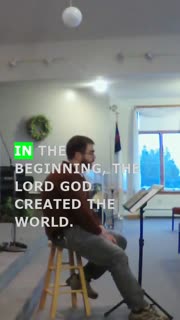Divine Love: The Sacrifice and Redemption of Christ
Devotional
Sermon Summary
Bible Study Guide
Sermon Clips
1) "And if Jesus was a good man, a worthy man, then this is a tragedy. But Jesus was not just good. He was the standard of good. He is perfectly and forever holy. And he was not just innocent of the charges that the Jews brought against him, but he is innocent of every charge that could ever be laid against him. He is completely and utterly without sin. And he is also powerful. It says that he has the authority and the power to summon an angelic army at any point in this event to save him, to release him from that suffering. But he doesn't. Why would he do that? Why would he subject himself to this? Why would he endure this? Why would he suffer this? the answer is, friends, for love. Because he loves you." [11:00] (84 seconds)
2) "In the beginning, the Lord God created the world. He created mankind. And he loves mankind. And we were created to be with him. And he desires to be with us. But we have all sinned. Every one of us has fallen short of the glory of God. And if we were to be with God in our sinful, fallen condition, to see him, to experience him, we would be consumed by grass and the fire. And so, for years, God dwelt with his people in the temple, dwelling in the Holy of Holies, behind a curtain. That curtain separated God from his people. And once a year, a priest could enter into that Holy of Holies after he had been cleansed, after he had repented, after he had been, after his sin had been atoned for by the blood of animals. He could go in once for a very short period of time." [12:37] (75 seconds)
3) "But when Christ died on the cross, that curtain was torn in two from top to bottom. There is no longer any separation that remains between God and his people. Because the sin that had required us to be kept apart has been paid for. It has been atoned for. It has been washed away forever and ever. And so, for those who believe, for those who place their faith in Christ, they are cleansed, they are forgiven, once and for all, of all of their sin. And that's what happened with the thief that was hanging beside Christ. He was a sinner. He deserved to die the same way that we all deserve for our sins. And yet he believed. And because he believed, through his faith, he was saved." [14:05] (67 seconds)
4) "That sin that had landed him on that cross was washed away. He was washed clean of his sin. And he could now enter into the presence of God without fear, forever and ever. He was washed clean of his sin by the blood of Christ. He believed. He was saved. John writes in John 3 that God so loved the world that he gave his only Son, that whoever believes in him should not perish but have eternal life. For God did not send his Son into the world to condemn the world, but in order that the world might be saved through him." [15:16] (47 seconds)
5) "Christ died for you. Christ died to save you from your sin. Christ died so that you could enter into the presence of the God who loves you forever and ever. Christ died for you because he loves you and he desires to live with you forever. And if we believe in him, if we have faith in him, even if we are the absolute worst of sinners, then we will not perish, but we will live with him forever. The price, cost, of your entry into God's kingdom is nothing less than the body of Christ broken for you. It is nothing less than the blood of Christ shed for you. And he shed it willingly on that cross because he loves you. he calls every one of us to trust in him for that forgiveness of sins, for that salvation." [17:02] (87 seconds)
Ask a question about this sermon
2) "In the beginning, the Lord God created the world. He created mankind. And he loves mankind. And we were created to be with him. And he desires to be with us. But we have all sinned. Every one of us has fallen short of the glory of God. And if we were to be with God in our sinful, fallen condition, to see him, to experience him, we would be consumed by grass and the fire. And so, for years, God dwelt with his people in the temple, dwelling in the Holy of Holies, behind a curtain. That curtain separated God from his people. And once a year, a priest could enter into that Holy of Holies after he had been cleansed, after he had repented, after he had been, after his sin had been atoned for by the blood of animals. He could go in once for a very short period of time." [12:37] (75 seconds)
3) "But when Christ died on the cross, that curtain was torn in two from top to bottom. There is no longer any separation that remains between God and his people. Because the sin that had required us to be kept apart has been paid for. It has been atoned for. It has been washed away forever and ever. And so, for those who believe, for those who place their faith in Christ, they are cleansed, they are forgiven, once and for all, of all of their sin. And that's what happened with the thief that was hanging beside Christ. He was a sinner. He deserved to die the same way that we all deserve for our sins. And yet he believed. And because he believed, through his faith, he was saved." [14:05] (67 seconds)
4) "That sin that had landed him on that cross was washed away. He was washed clean of his sin. And he could now enter into the presence of God without fear, forever and ever. He was washed clean of his sin by the blood of Christ. He believed. He was saved. John writes in John 3 that God so loved the world that he gave his only Son, that whoever believes in him should not perish but have eternal life. For God did not send his Son into the world to condemn the world, but in order that the world might be saved through him." [15:16] (47 seconds)
5) "Christ died for you. Christ died to save you from your sin. Christ died so that you could enter into the presence of the God who loves you forever and ever. Christ died for you because he loves you and he desires to live with you forever. And if we believe in him, if we have faith in him, even if we are the absolute worst of sinners, then we will not perish, but we will live with him forever. The price, cost, of your entry into God's kingdom is nothing less than the body of Christ broken for you. It is nothing less than the blood of Christ shed for you. And he shed it willingly on that cross because he loves you. he calls every one of us to trust in him for that forgiveness of sins, for that salvation." [17:02] (87 seconds)





